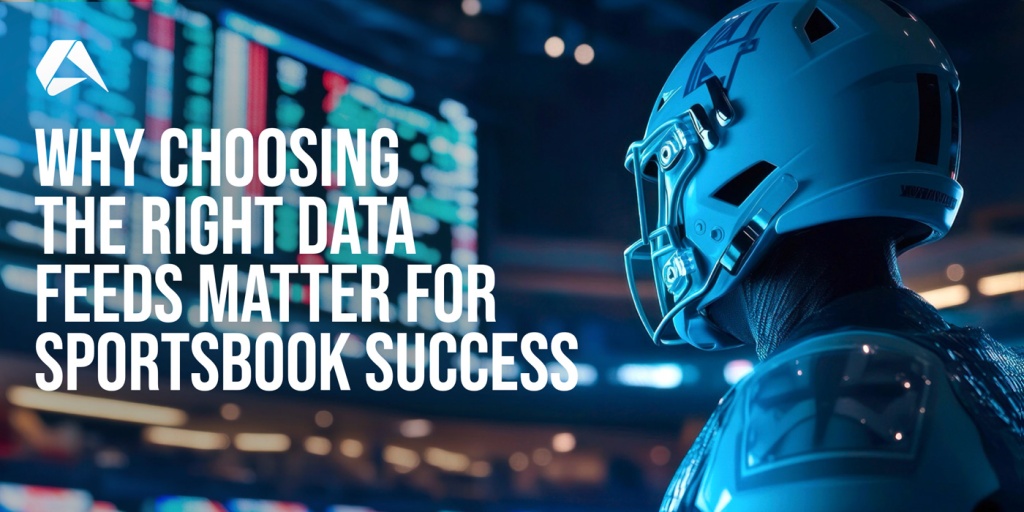If you are reading this page, you will likely already understand that success in sportsbook operations hinges on speed and precision. This mantra rings true for every sportsbook operator facing intense competition in today’s market. Yet, not all data feeds are created equal.
The quality of your data feeds directly influences user trust, operational agility, and, ultimately, your revenue streams. According to recent industry reports, sportsbooks using high-impact premium data feeds see up to a 30% increase in user retention - a clear statement testifying to the strategic advantage that quality feeds offer.
Let’s dive deeper into the mechanics of sportsbook data feeds and investigate how they work, what sets premium feeds apart, and why they are more than just a technical upgrade.
What is a Sportsbook Data Feed?
A sportsbook data feed is a flowing and continuous stream of information that supplies betting platforms with the essential details needed to run live betting markets. Simply put, it’s the fuel that keeps betting operations updated with the latest odds, game scores, statistics, and other data from sports events. These feeds ensure that every wager offered is accurate and current, allowing sportsbooks to deliver a reliable betting experience that meets the real-time pace of live sports.
To put their importance to operations in perspective, consider them the heart of a sportsbook. And like a steady heartbeat, data feeds pulse information through a sportsbook platform, keeping everything alive and synchronised. Without them, betting operations would grind to a halt, unable to light up the latest game stats or odds.
How Do Sportsbook Data Feeds Work?
Sportsbook data feeds are created through a three-stage data collection, processing, and integration system.
1. Data Collection
To create a data feed, you must first collect the data to calculate probabilities before turning them into betting odds. The data for sportsbook feeds is gathered through various methods, each offering unique advantages depending on the accuracy, speed, and coverage required. Here are the primary methods:
Stadium and Arena Sensors: These include cameras, motion sensors, and GPS trackers embedded in venues. They capture real-time data on player movement, ball position, and other in-play events, often used in fast sports like football, basketball, and tennis.
Official League Data Partnerships: Some sportsbooks establish partnerships with official leagues, providing direct access to accurate and comprehensive data. This can include stats, scores, injury updates, and even referee decisions sourced directly from the sport's governing body.
On-the-ground Scouts: Scouts are often equipped with mobile apps and report live data from the field or arena, such as game events, player substitutions, and weather conditions. Their observations offer a unique level of detail and rapid updates for data feeds.
Data from Wearables and Player Trackers: Some sports professionals use wearables (wearable technology), like GPS trackers and biometric sensors, which monitor player performance indicators such as heart rate, speed, and fatigue. These data points help refine in-play predictions, especially in individual sports like tennis or racing.
Video Analysis Software: AI-driven video analysis tools interpret broadcast feeds to extract real-time data, such as identifying goals, fouls, and other events. This method is useful in sports where direct data access may be limited.
Crowdsourced Data: Certain platforms leverage input from crowdsourced data, where fans or volunteers contribute live updates on stats and scores. Although typically supplementary, crowdsourced data can add detail and help cover lower-tier sports.
Social Media and News Feeds: Data is sometimes sourced from social media, news outlets, and team channels to capture insights on injuries, line-up changes, or last-minute updates that may affect odds. This can be crucial for assessing player conditions or other unexpected developments.
Automated Tracking Systems: High-tech systems like Hawk-Eye or Statcast use advanced algorithms to track play-by-play actions in sports like cricket, baseball, and tennis. These systems can measure ball speed, player movements, and exact game positions with high precision.
Betting Market Data: Analysis of real-time betting activities, such as bet volumes and market shifts, can also influence odds. This data can provide insights into betting trends and market sentiment, feeding back into the odds-setting process.
Weather Monitoring Services: For outdoor sports, live weather data is collected through dedicated services to gauge conditions like wind speed, temperature, and rain, which may impact game dynamics and player performance.
Historical Databases: Past game data, player stats, and historical performance records are stored in databases and provide the foundational stats for predictive modelling. They allow sportsbooks to create projections based on long-term performance trends.
2. Statistical Modelling and Probability Processing
Statistics collected on scores, player stats and other key data points are subsequently turned into a dynamic system of odds that reflects both real-time conditions and historical trends, enabling sportsbooks to offer accurate and engaging betting options.
Once data is collected, statistical models analyse it to predict outcomes. For example, algorithms might calculate the likelihood of a player scoring based on their historical performance, team match-ups, and current form. Models may account for variables like weather, injuries, or recent transfers, providing a fuller picture of each potential outcome. Algorithms then process this analysis to generate probabilities. Using machine learning or regression analysis, these algorithms evaluate patterns, comparing real-time stats against historical data to forecast what is likely to happen next. For instance, if a team has a strong home game record, that factor may increase the probability of them winning when playing at home.
The calculated probabilities are then converted into odds. Using decimal odds format, this involves dividing 1 by the probability of an outcome. For example, if a team has a 50% chance of winning, the odds would be set at 2.0 (or even money). Bookmakers may adjust odds slightly to include a margin, ensuring the house has a built-in edge. Adding a human touch to this process, some sportsbooks may employ sports traders to refine the betting odds. These professionals scrutinise raw algorithmic outputs, using their expertise to adjust for information that technology might miss. For example, they might account for subtle psychological factors, such as a team’s performance under pressure or a player’s form after returning from injury.
Traders also monitor market trends and bettor behaviour, ensuring the odds remain competitive and appealing while managing potential risks. Their work bridges the gap between data science and real-world dynamics, making the final odds not only accurate but strategically advantageous for the sportsbook. This blend of technology and human judgement is what sets the most successful operators apart, maintaining their edge in an intensely competitive market.
3. Real-Time Data Integration
Once validated, the data is swiftly delivered to sportsbook platforms, providing a near-instantaneous update on games and odds. Integrating these feeds requires a stable API connection and compatible software and technology infrastructure that allows the data to sync with the platform’s interface. This real-time feed integration enables sportsbooks to keep pace with the action, offering bettors a dynamic and responsive experience.
Types of Sportsbook Data Feeds: Regular vs Premium
Sportsbook data feeds are typically available in two main formats: regular and premium. Each offers advantages tailored to different operational needs and budgets.
Regular data feeds provide basic information necessary to power betting markets, though often at slower update speeds. These feeds may lack the depth of real-time data and can be limited in scope, making them suitable for smaller operations or less time-sensitive betting markets. However, they may compromise on immediate accuracy and detailed statistics.
Premium data feeds are built for sportsbooks that demand speed and precision. Near-instantaneous updates supply comprehensive, in-depth information, from player stats to live scores, facilitating a richer, more immediate betting experience. Premium feeds are customisable and often supported by advanced APIs, delivering flexibility in presentation and integration.
The key differences, therefore, lie in speed, accuracy, and data depth. While regular feeds offer essential data with a focus on affordability, premium feeds raise the bar with faster delivery, precise updates, and the ability to tailor services to a sportsbook’s specific needs, ultimately providing a more engaging experience for bettors.
How to Choose the Right Data Feed Provider for Your Sportsbook
Selecting a data feed provider is a critical decision that shapes a sportsbook’s accuracy, responsiveness, and customer appeal. When choosing a data feed provider, operators should begin by assessing data accuracy and update speed, as these factors ensure betting markets reflect real-time conditions. Furthermore, consider the breadth of coverage. For example, does the provider accommodate both mainstream and niche sports? This can significantly impact the variety of betting options you offer.
As a standard rule, operators should always evaluate integration compatibility to determine how easily the provider’s feeds can work with existing sportsbook software. A solution with advanced APIs typically simplifies integration and reduces downtime. Cost-effectiveness is another significant consideration. Does the pricing align with the operator's market size and revenue expectations?
Providers with exclusive partnerships, such as Genius Sports or Sportradar, may offer unique advantages, but relying solely on one source can limit flexibility. By integrating multiple data feeds into advanced sportsbook platforms like Altenar, operators can create a dynamic betting system that combines the strengths of various providers, delivering substantial accuracy and variety to sports bettors.
For operators seeking a data-driven sportsbook solution that stands out, Altenar’s sports betting platform combines official feeds from multiple top-tier providers for superior performance. Reach out now for a personalised consultation to see how we can support your operational goals.
How Data Feed Quality Impacts the User Experience
In essence, the quality of data feeds directly shapes how bettors perceive and interact with a sportsbook. Real-time, accurate data creates a fluid experience where odds updates and match statistics reflect the live action without delay. This immediacy enhances the thrill of betting, inspiring trust and satisfaction as users feel confident they are wagering on reliable information and bets will be placed without disruption.
To achieve the highest levels of speed and accuracy, sportsbook owners must focus on integrating premium data feeds. Quality feeds from official suppliers go beyond delivering accurate information - they set the standard for reliability. By consistently meeting user expectations, they encourage deeper engagement and reinforce loyalty, transforming a sportsbook into a trusted hub for both casual and committed bettors, which is invaluable.
In contrast, reliance on non-premium providers introduces risks. Delayed updates and inconsistent data disrupt the flow of betting and erodes user confidence. For bettors, inaccuracies can translate to missed opportunities or confusion, leading to frustration and a loss of trust in the platform.
Technical Impact of Data Feeds on Sportsbook Infrastructure
Irrespective of the quality of service implemented, integrating data feeds into a sportsbook platform places significant demands on infrastructure. At a basic level, systems must handle data intake, processing, and real-time distribution without lag. Regular feeds, often slower and lighter, require modest server capacity and lower bandwidth. On the other hand, premium feeds demand faster servers, scalable storage, and load handling, which are optimised to accommodate the constant influx of real-time, detailed data, especially during peak betting periods.
Maintenance and support are also important concerns in this setup. Data feeds require continuous monitoring to avoid disruptions that could affect live odds or user experience. Regular feeds may need less oversight but often lack the support systems provided by premium providers. High-end feeds, with their advanced features, involve higher complexity and depend on frequent updates and proactive technical support to keep operations running smoothly. Without proper maintenance, issues such as latency, integration glitches, or downtime can undermine the platform's reliability.
Finally, the cost-benefit ratio is key when deciding on infrastructure investments. Premium feeds carry higher operational costs, from initial integration to ongoing maintenance. However, the return can be substantial in terms of enhanced user satisfaction, improved customer retention, and greater operational efficiency. Operators must weigh these benefits against budget constraints, recognising that a premium solution not only supports current demands but positions the sportsbook for sustained growth in a competitive market. A well-executed infrastructure strategy fundamentally balances cost with long-term value.
Common Challenges in Feed Implementation
In addition to latency issues during fast-paced live events, data integration complexities may also occur, as feeds from multiple providers must be harmonised within a single platform to ensure consistency across markets. Managing data for diverse sports and events adds another layer of difficulty, requiring systems capable of handling large volumes of information without compromising speed or accuracy.
On another level, regulatory considerations further complicate implementation. Different markets demand adherence to specific compliance standards, ranging from data transparency to fair play regulations. Premium data suppliers and advanced sportsbook providers often streamline this process by offering feeds aligned with legal requirements, saving operators significant time and effort.
Security and reliability considerations are equally important. Data feeds are the foundation of a sportsbook’s trustworthiness, and any compromise in data integrity can damage reputation and user confidence. Implementing the proper protocols to safeguard against breaches and ensuring consistent performance are essential steps to optimising a platform for long-term success.
Evaluating and Upgrading Your Sportsbook Data Feeds
Assessing the quality of your current data feeds begins with a critical look at their speed, accuracy, and coverage. Are updates arriving in real-time, and do they provide sufficient depth for all sports and betting markets you offer? Examine user feedback to identify recurring issues, such as lagging odds or incomplete data, which could indicate gaps that need addressing. Also, consider the technical performance of your feeds. Are they harmoniously integrated with your platform, and can they handle peak usage without disruptions?
Here is a list of actionable steps existing sportsbook owners can take to evaluate their data feeds.
-
Regularly check odds and updates for errors that could impact trust.
-
Test refresh rates during live events to verify real-time performance.
-
Ensure feeds include all relevant sports, events, and betting markets.
-
Collect user opinions to uncover issues with data reliability.
-
Confirm feeds work with your platform and scale during peak traffic.
-
Ensure infrastructure handles heavy loads without issues.
-
Compare feed quality against competitors to identify differences.
-
Check feeds meet regulatory needs in all operating jurisdictions.
-
Research premium providers for faster, more accurate options.
If shortcomings emerge, explore alternative solutions. Evaluate their ability to enhance operational efficiency, support compliance, and ability to deliver an improved user experience. Finally, the investment should be weighed against the potential ROI, considering how improved data reliability could translate into higher user satisfaction and stronger user retention.
Upgrade your sportsbook with Altenar’s premium data feeds and expert trading solutions. Schedule your software demonstration today and explore how our platform delivers the speed, accuracy and trust your users will value.













